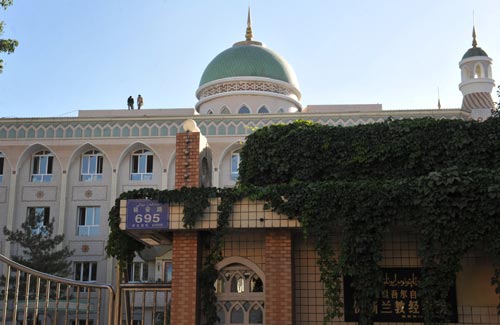Muslim students look to the future
Updated: 2012-09-27 09:00
By Cui Jia (China Daily)
|
|||||||||||
Islamic centers of learning train a new generation, reports Cui Jia in Xinjiang.
As the students filed into the mosque at the Xinjiang Islamic Institute, Chinese construction workers repairing the buildings quietly laid down their tools and waited in silence as the scholars performed the fourth of the five daily prayers required by the Muslim faith.
On graduation from the institute in Urumqi, the capital of the Xinjiang Uygur autonomous region, the students will be awarded bachelor's degrees and then return to their hometowns where they will gradually become the new generation of mosque leaders.
The carpets of the traditional-style mosque - a structure topped with minarets and an onion dome whose windows allow sunlight to flood the prayer hall - have been removed for cleaning while the workers fix a leak in the roof. Funded by the regional government, the main building and dormitory of the school have also been reinforced to make them less vulnerable to earthquake damage.
|
|
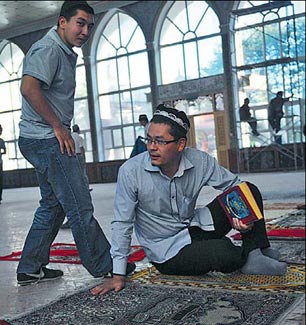 Students prior to the start of prayers. |
After 15 minutes of prayer, the students stood up and put their shoes back on. They then walked back to their classrooms in the four-story building next door. A few minutes later, the beautiful, calming sound of chanting could be heard as Quran recitation classes resumed.
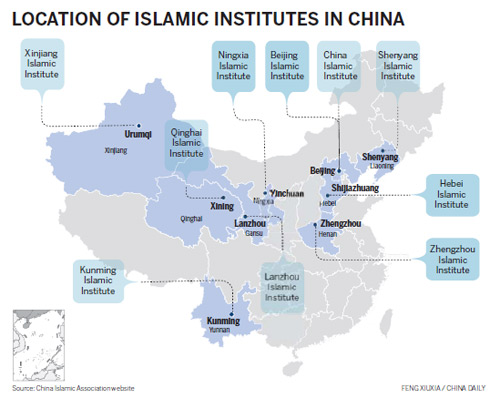
China has 10 Islamic institutes; Xinjiang is among the largest and the only one that teaches in the language of the Uygur ethnic group. The students' day begins before sunrise with the first prayer, and in contrast to secular universities, all courses at the school are scheduled to take place between the prayer sessions.
The mosque, built in 1987 when the institute was founded, is an important teaching facility where students learn how to perform a variety of religious tasks.
"Senior students take turns learning how to take prayers and interpret the Quran. That's the minimum they are expected to do. Some are overwhelmed at first but they have to get used to it," said Abudurehep Turmniaz, dean of the institute, which currently has 219 students, most of whom follow the Sunni branch of Islam.
"Although they will have a bachelor's degree and a deep knowledge of Islam after five years of study, it will still take years for them to gain the respect of the locals and become imams (leaders of worship at mosques)."
The Quran, the holy book of Islam, must be recited in Arabic. For those whose first language is not Arabic, memorizing all 30 books of the Quran word for word and then chanting them requires skill and dedication. The institute invites voice teachers to train elite students and help them improve their chanting.
"We require our students to digest and memorize two books (of the Quran) every semester, but for some it's a very challenging task. Officials can use notes when addressing the public, imams can't. Locals won't accept an imam who cannot chant fluently by heart," said the bearded Abudurehep, dressed in a traditional imam's gown.
"Simply memorizing the Quran is not enough. I need to understand the exact meaning of every Arabic word, so I can interpret it correctly for the people," said Jamarlitin Wahli, who wore sneakers and a sweat shirt. Although the sophomore is only 20, he is already one of the few people at the institute who can recite all 30 books of the Quran.
Jamarlitin's sonorous voice and accurate pronunciation led to him being selected by the Chinese Islamic Association to represent the country at an international Quran recitation contest in Dubai in the United Arab Emirates in July. He left with the award for excellence.
"Although my chanting is not that much different from people from other countries, I feel that I am actually better at it than most of them," he said.

The young scholar hails from Artux city in southern Xinjiang, where his grandfather - an imam at a small mosque - began teaching him the Quran at an early age. The old man is proud that his grandson was accepted as a student by the best Islamic academy in the region.
"My grandfather always asks me not to be arrogant and to take the opportunity to master the spirit of the Quran so I can teach him when I return home," said Jamarlitin.
"In the past, the Quran was passed down by word of mouth in Xinjiang. It was easy to tell whether an imam came from Turpan in the east or Kashgar in the south because of his accent when he chanted. But at the institute, we teach the students Arabic according to classical pronunciation. Some of our teachers are sent abroad to study so they can set the standard," said the dean.
When Memetimin Abudulla returned to the institute in 2011 after five years at Al-Azhar University in Egypt, the world's leading center for the study of Arabic literature and Islamic learning, he was surprised at the transformation the institute had undergone.
"When I arrived as a freshman in 2000, the institute only had one building. We didn't have a dormitory or canteen. Now I feel that the teaching and living conditions here are even better than at Al-Azhar," said the 29-year-old Kashgar native, looking smart in his blue suit. "Now at least, students don't need to stand through classes because there are not enough tables and chairs as they do sometimes at Al-Azhar. But there is so much to learn in Egypt - it's like swimming in an ocean of knowledge."
At age 15, Memetimin became determined to study at the Xinjiang institute after hearing a recording of the Quran being chanted by one of the teachers at the school: "The chanting was so beautiful and I said to myself that I need to learn from the best, but I never imagined that I would study at Al-Azhar University."
Those wishing to study at the Xinjiang Institute, all young men aged 18 to 25, find that gaining entry is difficult, as it requires a character reference from respected imams as well as high scores in the entry exams. Successful applicants, whose tuition fees are all paid by the regional government, are required to be devoted to carrying Islam forward in Xinjiang.
Student numbers are beginning to rise. This year, the college admitted 40 new students, but previously it accepted only 50 every two years. "The expansion of the school depends on the social and economic development of Xinjiang," said Ilijon Anayt, a vice-dean at the institute.
Memetimin, who has a bachelor's degree in Islamic theology from Al-Azhar, is now a teacher at the institute and a role model for younger students.
The former winner of the first prize at the Chinese national Quran recitation contest has been providing extra tuition to five students to prepare them for the next competition, which will be held next year. "The teaching of Arabic has been raised to another level and so the students find it easier to progress."
About 70 percent of the courses at the institute are related to Islam, including recitation and interpretation of the Quran, and Arabic. Students also study Uygur literature and Mandarin.
"Uygur is their mother tongue, they have an duty to master it, both in the spoken and written forms. Meanwhile, Mandarin is the official language of China, so there is no excuse for our students not to learn it well. Good Mandarin skills will also help them to better communicate with Muslims from other parts of the country, said Ilijon.
"In China, a lot of Islamic literature was originally written in Mandarin. If our students could accurately translate those books into Uygur, they would be able to pass on that knowledge with greater ease," he said.
Traditional meets modern
Although it's rooted in Islamic tradition, the school provides computer lessons so students can find and download learning materials from the Internet. Some students have even replaced their textbooks with tablet computers.
|
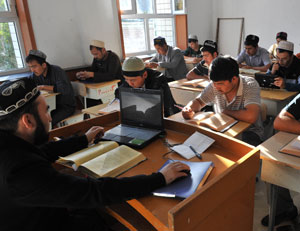 |
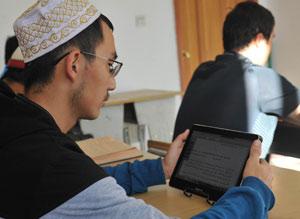 |
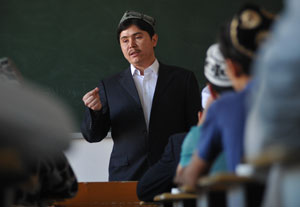 |
|
From left to right: Tahier Aji teaches the Quran to senior students. A student uses a tablet computer to learn the Quran. Memetimin Abudulla returned to the institute last year after five years in Egypt. |
||
When the other students leaf through the pages of their Qurans, searching for the chapter specified by the teacher, Nurmemet Nurahmet just slides his finger on the touch screen of the tablet computer he bought three months ago. The senior student has installed applications for an audio book of the Quran and Arabic pronunciation on the device. "Students from other universities use new technologies to help them study. So should we," he said.
"If I have a problem with the pronunciation of a certain sentence, I can listen to it as many times as I like. Also, the tablet saves the trouble of carrying heavy books," said the 26-year-old scholar, who added that the 4,000 yuan ($634) he spent on the device was worth every penny. "Religion can and should adapt to new technology."
More than 40 senior students now take tablet computers into classes, said Ilijon. "We encourage them to do so. Maybe we should just give everyone a tablet computer instead of heavy books?"
Alim Rehman, also a vice-dean at the institute, said the school will eventually relocate to a bigger campus in the university district on the outskirts of Urumqi. The plan was approved earlier this year and the central government has allocated 270 million yuan to construct a new campus covering 10 hectares.
"We will always remember this place," Alim said, recalling how students and teachers saved 15 people during a 2009 riot in Urumqi in which 197 people were killed.
"Some people who were being chased by rioters ran to the school gate crying for help. We let them in without any hesitation and then waited to see if anyone else needed help," he said. Later that evening, the school fed the victims and offered them accommodation until the violence died down.
The institute will move from a neighborhood with a relatively strong religious atmosphere to a district where young people from different universities live side by side, but Alim has no qualms about the relocation.
"I believe there is no downside to our students mixing with other young people. After all, our students have to learn to respect tradition, but also to embrace the modern world," he said. "Religion needs to adapt to and serve modern society, otherwise it simply won't develop," he warned.
After the move, the old institute will provide services to help Xinjiang's Muslims preparing to undertake the hajj (the Islamic pilgrimage to Mecca, Saudi Arabia). So far, the institute has helped more than 10,000 people from the region prepare for the pilgrimage.
More than 564 students have graduated from the institute since 1987, and most have gone on to become imams or teachers at local Quranic schools.
Since 2001, the institute has also sent more than 35 of its graduates to study overseas.
"Sometimes the locals have difficulty understanding our graduates because the concepts they are explaining are new to them. Meanwhile, the graduates need to learn to address issues in a way the villagers can understand and accept. Both sides need to adapt to each other," said Ilijon.
"When they complete their studies, the graduates will be better able to serve Xinjiang's Muslims and their knowledge could have an impact across the region during the next 50 years," he said. "Some people try to implant extremist ideas by interpreting the Quran incorrectly. Our students will help the people stay away from that."
Since the renovation work started at the institute, Abudurehep has visited the mosque every day to inspect the progress.
"At the beginning, the workers didn't realize how important the prayers are to us and they carried on with their work during prayers so they could meet their deadline. But now they stop when the students begin to gather, even though no one has asked them to do so. I am grateful for their respect and understanding," said Abudurehep as he gazed up at the newly painted roof.
Contact the reporter at cuijia@chinadaily.com.cn
Related Stories
Xinjiang Islamic Institute 2012-09-26 17:50
China's Muslims prepare for sacred pilgrimage 2012-09-26 08:07
HK's Muslims rally to protest against US-made film 2012-09-24 09:54
Actress in offensive film sues producer 2012-09-21 08:15
China, Arab countries seek economic co-op 2012-09-14 21:39
Religious Culture 2012-08-28 13:56
Today's Top News
President Xi confident in recovery from quake
H7N9 update: 104 cases, 21 deaths
Telecom workers restore links
Coal mine blast kills 18 in Jilin
Intl scholarship puts China on the map
More bird flu patients discharged
Gold loses sheen, but still a safe bet
US 'turns blind eye to human rights'
Hot Topics
Lunar probe , China growth forecasts, Emission rules get tougher, China seen through 'colored lens', International board,
Editor's Picks

|

|

|

|

|

|
